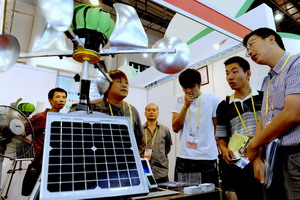Novozymes: Biotech that helps fuel 'green' growth
Updated: 2011-09-14 08:06
By Xu Junqian (China Daily)
|
|||||||||||

With global economic power shifting from West to East, many multinational companies are gearing up to meet increased demand from strategic emerging industries in such expanding markets as China.
As one of the world's leading producers of industrial enzymes, Novozymes believes that biotechnology has become a huge opportunity for China to reshape and upgrade its industrial structure, and a critical pathway for the country's green, sustainable growth.
"Novozymes will continue our joint efforts with our Chinese partners - COFCO and Sinopec - in accelerating the industrialization of advanced biofuels," said Thomas Nagy, executive vice-president of Novozymes.
"Our partners, Sinopec and COFCO, have announced plan to construct 50,000-metric-ton-per-year-capacity demonstration facility for cellulosic ethanol which is possibly to come online in 2013," Nagy said.
China is world's third largest bio-ethanol producer after Brazil and the United States, manufacturing 1.75 million metric tons of bio-ethanol in 2010.
The feedstocks for bio-ethanol will be a mixture of corns, grains, cassavas and also agricultural wastes and energy crops. Novozymes is one of the major enzyme producers in enabling the conversion from biomass into bio-ethanol.
"China can lessen dependence on imported oil whilst create new growth opportunities in rural areas," Nagy said.
"Also, finding alternative energy is an urgent task to maintain the nation's current economic development and the rate of energy consumption," he said.
To explore more exciting opportunities in beyond biofuels, Novozymes is seeking more collaboration with local companies in bio-chemical industry.
Novozymes is also working with starch processing company Dacheng Group and Meihua Group, which processes corn, to develop industrialized bio-chemical production technology and shift food-based processing to renewable sources.
In the meanwhile, Novozymes' new Household Care center for Asia is scheduled to be fully operational in Beijing this autumn. "Detergents and especially the use of enzyme technology have been underutilized in emerging economies," Nagy said.
In China's 12th Five-Year Plan (2011-2015), the government has identified seven Strategic Emerging Industries (SEIs) and provided a favorable policy framework for these. Biotechnology is one of the seven SEIs and is thus expected to get more favorable conditions.
The seven industries together are expected to contribute 5 percent of the country's GDP by the end of 2015, up from 2 percent now.
Since Novozymes arrival in China in the early 1990s, the country has become its second-biggest market following the United States.
Sales in the Asia-Pacific region accounted for 19 percent of the company's total revenue in 2010, with China taking a major part, according to company figures.
Novozymes is also increasing R&D investment as a strategic decision to explore growth opportunities in China. Last year, its R&D spending increased 13 percent to 1.36 DKK billion ($262 million), representing 14 percent of sales.
"At Novozymes, collaborative innovation is crucial to unlocking potential and applying the advantages of biotechnology," Nagy said.
(China Daily 09/14/2011 page39)
- China, Russia to build sustainable trade ties
- ADB cuts 2011 China growth forecast to 9.3%
- Bun shops 'sneaking in banned additive'
- CBD fest to mark start of core project
- Premier Wen calls for financial stability in US
- Property prices will fall in next 12 months, HK developer Lo predicts
- Banking watchdog warns of P2P loan risk
- Italy bond purchase may be on the cards














